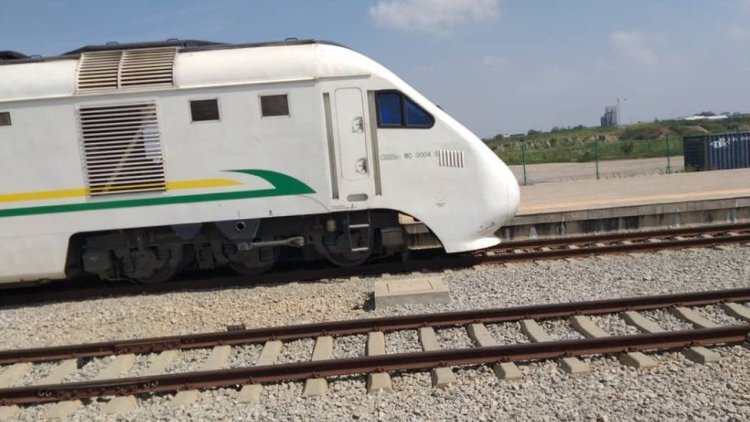168 people are still missing after a railway bombing in Kaduna, Nigeria.
Once the 190-kilometer (120-mile) route is repaired, military planes will escort passenger trains between Kaduna and Abuja, according to Mr. Amaechi.

According to the state rail corporation, 168 persons are still missing in Nigeria following a horrific attack on a crowded train last week.
It's unclear how many of the 168 were kidnapped for ransom, and some may have returned home without informing authorities.
Last Monday, gunmen blew up a section of rail between Abuja, Nigeria's capital, and Kaduna, the northern city.
At least eight passengers died as a result of the event.
One survivor told the BBC that a decision to change carriage could have saved his and his family's lives.
On the condition of anonymity, he remarked, "I am delighted that I am alive and healthy."
"But I feel so sorry for those who were murdered and injured - it could have been me," said the man, who nearly missed the train but managed to reach it just in time with his wife and two children.
After boarding, the family walked from one carriage to the next after other passengers informed them that they were in the wrong seats.
They had been in coach 17, which had been one of the targets of the attack but had been transferred to coach 12.
"At about 19:45, we heard a huge explosion that jolted the train and brought it to a standstill," he claimed.
As the attackers appeared to surround the train, there was a sudden barrage of gunfire coming from all directions.
"I gathered my family and we lay down on the railway floor like other passengers," he added.
"We heard people yelling instructions at passengers in other carriages after a while, so it appeared the shooters pushed their way inside the coaches." There was also gunfire heard inside the coaches.
"People were escorted from the carriages and led into the woods." "No one got into our bus," the survivor stated.
"Changing coaches saved my life and that of my family."
No one has claimed responsibility for the attack on Monday.
However, the governor of Kaduna state believes it was the result of Boko Haram Islamists collaborating with a kidnapping gang and claimed that rescue attempts were underway, but that no ransoms would be paid.
The train had 970 passengers on board when it was raided, but the Nigerian Railway Corporation has not revealed if the 168 persons missing are all passengers or if some train workers are among them.
According to the Reuters news agency, relatives of several of the missing said that suspected bandits contacted them to inform them that their loved ones were being held captive.
Such gangs have become rife in northwest Nigeria, and Kaduna state is considered the epicenter. Earlier this month, there were reports that Kaduna's airport was attacked.
In the last 24 months in Nigeria alone, armed gangs have killed hundreds of people and forced thousands to flee their homes.
'Nowhere is safe,' says the narrator.
Between Abuja and Kaduna, roadside kidnappings are all too regular, thus the train service appeared to be the only safe and economical choice available.
However, Nigerians were outraged because this was the second armed gang attack on the same line of railway in six months.
"Nigerians are finally convinced that no place is safe," said Chris Paul Otaigbe, a journalist and security observer.

"Many individuals would now want to stay at home or in their neighborhoods," he added, adding that businesses that rely on a regular flow of people between northwestern Nigeria and Abuja would be the hardest hit.
Despite promises made after the October attack to make Nigeria's train network safer, little progress appears to have been accomplished.
After last week's incident, Transport Minister Rotimi Amaechi remarked, "I am horrified and I honestly don't know what to tell Nigerians any longer." "It took a long time to find grated security surveillance and monitoring system. We could have saved lives if the procedures had been reduced."
He told the BBC that there were roughly 18 police officers on Monday's train, but they were outgunned and eventually ran out of ammo.
Once the 190-kilometer (120-mile) route is repaired, military planes will escort passenger trains between Kaduna and Abuja, according to Mr. Amaechi.
He, on the other hand, denies that the inability to protect passengers' lives is a symptom of Nigeria's larger security problems.
Mr. Amaechi stated, "You cannot claim Nigeria is a failing state." "If you want to deal with insecurity, you have to deal with poverty first."
Farooq Kperogi, a Nigerian critic, is skeptical, claiming that the "tragic" train attack demonstrated "the absence of even a pretense to administration in Nigeria." Meanwhile, public affairs analyst Charles Ughele accuses Nigerian authorities of "dereliction of duty," drawing a comparison between their leadership and that of Ukraine's troubled President Volodymyr Zelensky.
Opposition leader Kassim Afegbua of the Peoples Democratic Party has called on Nigerian President Muhammadu Buhari to resign, saying he is "utterly ashamed" of the government's inactivity.
Garba Shehu, the presidential spokesman, told the BBC that military and security chiefs have been given orders to be more "decisive" in their pursuit of bandits, and that "surveillance and monitoring platforms" are being sought for the Abuja-Kaduna railway as well as the Lagos-Ibadan rail link in southern Nigeria.
Six months ago, similar technology was promised but never delivered.
Mr. Shehu, on the other hand, dismissed evidence that an armed group stormed Kaduna city's airport in March, claiming that "sure, they fired at a civilian surveillance official near the perimeter fence, which is extremely terrible, but the Kaduna airport was not breached."
Mr. Shehu told the BBC, "I will not pretend to you that we don't have security difficulties."

 Boakyewaa Lawrencia
Boakyewaa Lawrencia 


































